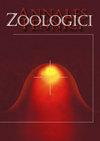Cortisol in Hair: Do Habitat Fragmentation and Competition with Golden Jackal (Canis aureus) Measurably Affect the Long-Term Physiological Response in European Wildcat (Felis silvestris)?
IF 0.9
4区 生物学
Q4 ECOLOGY
引用次数: 4
Abstract
Measurements of cortisol levels in hair are a non-invasive method to study potential chronic stress that may affect carnivores' welfare. Using hair from 15 frozen and 18 taxidermied road-kill individuals, we aimed to provide information on the long-term physiological response of European wildcats (Felis silvestris silvestris) to habitat fragmentation and potential interspecific competition with golden jackals and red foxes. Our findings revealed that wildcats seemed to be unaffected by habitat fragmentation, suggesting that the facultative specialist behaviour of the species may lead to better toleration of human-altered environments. Red fox presence did not affect cortisol levels. However, significantly higher cortisol levels were measured in hairs of wildcats exposed to golden jackals, suggesting that the potential competition between the two species may lead to an increase in allostatic load in wildcats.毛发中的皮质醇:栖息地分裂和与金豺(Canis aureus)的竞争是否可测量地影响欧洲野猫(Felis silvestris)的长期生理反应?
测量毛发中的皮质醇水平是研究可能影响食肉动物福利的潜在慢性压力的一种非侵入性方法。利用15只冷冻和18只路杀动物标本的毛发,我们旨在提供关于欧洲野猫(Felis silvestris silvestri)对栖息地破碎化和与金豺和赤狐的潜在种间竞争的长期生理反应的信息。我们的研究结果表明,野猫似乎不受栖息地破碎化的影响,这表明该物种的兼性专业行为可能会使其更好地耐受人类改变的环境。红狐的存在不会影响皮质醇水平。然而,在暴露于金豺的野猫毛发中测得的皮质醇水平明显更高,这表明这两个物种之间的潜在竞争可能会导致野猫的同种异体负荷增加。
本文章由计算机程序翻译,如有差异,请以英文原文为准。
求助全文
约1分钟内获得全文
求助全文
来源期刊

Annales Zoologici Fennici
生物-动物学
CiteScore
2.40
自引率
14.30%
发文量
10
审稿时长
>12 weeks
期刊介绍:
Annales Zoologici Fennici publishes mainly original research reports, but also in-depth reviews and commentaries on all aspects of animal ecology and evolution, and fields related to them. Our aim is to promote papers which focus on the interactions among various components in the past and present environments by using integrative and cross-disciplinary approaches. This may be achieved by employing tools from different fields of research, such as (but not restricted to):
ecology and paleoecology,
molecular ecology and phylogeography,
conservation biology, human-induced contemporary evolution and wildlife management,
animal behaviour and interactions (including recognition systems and mechanisms),
paleontology (except systematics and taxonomy) and evolution,
bioenergetics.
 求助内容:
求助内容: 应助结果提醒方式:
应助结果提醒方式:


